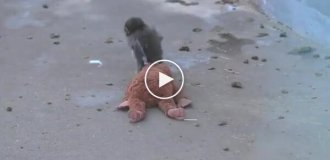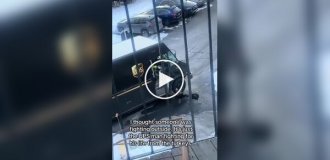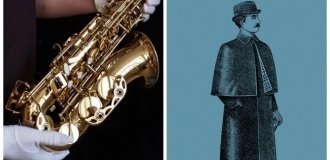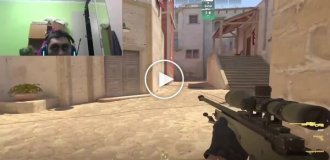Georgian police (38 photos)
chistoprudov writes: “In exactly a week the federal law “On the Police” should come into force in Russia. Personally, I don’t believe that this reform will be of much use. Having visited Krasnaya Polyana and talked with local traffic police officers, it is not possible that in a week these people will change, learn the laws and begin to respect ordinary citizens and take care of their safety. I don’t want to offend honest police officers, but I rarely come across them. Last year, together with Mikhail Podorozhansky (editor-in-chief of Autoreview magazine), I spent two days in the company of Georgian police officers. Before the arrival of Saakashvili, the Georgian Ministry of Internal Affairs was considered synonymous with corruption, lawlessness and thieves in law (well, just like ours!), but now citizens have a completely opposite attitude towards this department - the Georgian Ministry of Internal Affairs is trusted by 87% of the population, when before the reform this percentage was lower 10. Our reformers definitely have a lot to learn from their Georgian colleagues. This time there will be a lot of text, and photographs as accompaniment. It's better to stock up on a cup of tea or coffee.


1. As Zhirinovsky said: Russia can only be saved by two scenarios - real and fantastic. The real one is if aliens arrive and do everything for us. Fantastic - if we do everything ourselves.

2. Rashid Nurgaliev: “Renaming the police to police is not a “change of sign”, but a “deep reform”... According to the head of the financial department of the Ministry of Internal Affairs of the Russian Federation, Svetlana Perova, it follows that “approximately 500 million will be spent on making new signs for buildings and stickers for company cars. Another billion rubles will be spent on making badges for police officers (the cost of one badge will be 800-1000 rubles).” A billion rubles for badges! In 2004, immediately after Saakashvili’s victory in the elections, the heads of all law enforcement agencies of Georgia were fired - and, as usual, the main target of the reformers was the road inspection. Misha (this is not a familiarity - this is how the president is called even on official websites) set an ultimatum: if extortions on the roads do not stop within a week, then all police officers will follow the Minister of Internal Affairs. No one is going to fire Minister Rashid Nurgaliev...

3. After the reform, in the first months of the patrols’ work, the airwaves of leading television companies were filled with footage of bribes being given to new “traffic cops”, which were filmed with a hidden camera by intelligence agents. Those caught taking a bribe of $50 were sent to prison for 10 years. This continued until their colleagues realized that they couldn’t take it. During the first day of the law “On Patrol Police,” about 15 thousand police officers lost their jobs. Then the same amount. Georgia lived without a road inspection for three months. At this time, new employees were recruited and trained, and, as a rule, young and without experience in the “old” police: the staff was updated by 85%! (in Russia, by 2012, only 20% of police officers will be fired). Thousands of new Volkswagen Passats, Opels and Skodas were purchased for the employees of the new “patrols”, in which they quite successfully began to chase criminals on the streets. It is clear that they imprisoned not only servicemen, but also crooks of all stripes, from thieves in law to petty pickpockets. Result? A Honda stopped near a grocery store and the driver went shopping, leaving the doors and windows open. The keys were sticking out of the ignition... They say that all the thieves are either in jail or have fled to Russia.

4. At the same time, the authorities began a campaign to popularize the police. Billboards with photographs of smiling “patrols” of both sexes were hung on the streets. The police were invited - in the American way - to schools to teach lessons. Georgian children, instead of criminals, began to play police officers who catch these criminals. For several years now, Georgian police officers have not taken bribes at all - and, according to surveys, 87% of the country's residents trust the police: only the Orthodox Church enjoys great authority. Georgian policeman is second only to God! Ordinary citizens say that getting rid of the traffic police was a big relief for people.

5. All over Georgia, police departments moved: some to the fashionable villas of thieves in law who fled the country after the adoption of legislation to combat organized crime, and for the rest, the state built new buildings. Moreover, by order of Saakashvili, their main feature is complete transparency.

6. Indeed, all new police stations are built of glass and concrete so that any passerby can see what is happening inside. The new building of the Ministry of Internal Affairs in Tbilisi is also “glass,” but this is an imitation of transparency. In addition, there are sentries on the approaches and they won’t let you get close without an escort.

7. You can compare our traffic police post and the Georgian police department. “There are no closed little offices, no secret little rooms where people are tortured,” says Ekaterina Zguladze (Deputy Minister of Internal Affairs of Georgia). “There is a single space where the entire department sits together and works, and you can not only take our word for it, but also easily see it from the street.”

8. Bribery did not go away immediately. Head of the Department of the Ministry of Internal Affairs of Georgia Shota Utiashvili on the reform:
“The main consequence of the reforms was the real fight against corruption in the country. In the area of combating bribery, we warned the police that we would imprison them for taking bribes. As a result, in 2005 alone, more than 200 police officers were imprisoned for bribery. In 2006 there were even more, and only after that the number of police officers arrested for bribes began to decline.
The second important aspect in the fight against corruption was a sharp increase in salaries for all employees of the Ministry of Internal Affairs. For example, in 2004 my salary was only 100 lari (about 70 US dollars), and now it is 2300 lari (about 1610 US dollars). That is, my salary during this time increased 23 times.
Thirdly, bosses stopped demanding tribute from their subordinates, part of which they previously kept for themselves, and part of which they transferred upward.
In addition, many had to be fired. In particular, if under Shevardnadze there were about 70 thousand employees in the Ministry of Internal Affairs, now there are 16 thousand employees in the police and state security units that are part of the Ministry of Internal Affairs. New people were hired to replace those fired—younger and more motivated.
One of the consequences of the reform of the Ministry of Internal Affairs was a new personnel recruitment system. So, if under Shevardnadze a young employee had to pay a bribe to get a job in the Ministry of Internal Affairs, now this is no longer the case. Currently, there is a 4-stage system for selecting employees of the Ministry of Internal Affairs, consisting of numerous tests.”

9. After returning from Batumi to Tbilisi, Podorozhansky and I joined two patrol policemen. The police Octavia is driven by Major Robert, with Senior Lieutenant Alexander on the right. Both have been in the police force for six years, both are driving unbelted, with Robert’s belt pulled behind the back of the seat (on country roads belts are already mandatory, but in populated areas you can drive without belts until the end of the year). Robert drives confidently, but road markings almost always end up between the wheels of his Skoda. When Mikhail jokingly asked why not save the budget and abandon markings altogether, Robert nevertheless began to adhere to the rows.

10. Robert said that in Tbilisi they are especially strict about driving beyond the stop line when the traffic light is prohibiting. Moreover, the police patrol does not monitor this: cameras are installed at intersections, and the monitoring center records violations - and sends “chain letters” to drivers with instructions to pay a fine within a month. The offender can go to the website www.police.ge, enter the password specified in the letter, and view an incriminating fragment of the video recording. You can immediately write a letter of justification, and if the arguments are considered compelling, then a fine can be avoided. My personal opinion is that this system clearly does not work 100%. Driving in Tbilisi is still quite bad, and in theory, every third person should receive fines every day...

eleven.
Fearing that in Georgia - in the American style - it is no longer accepted or forbidden to ask about income, Mikhail frames the question correctly:
— Is it possible to inquire about the level of salaries?
Can! Robert, the eldest in rank, has about $750, and Alexander has about $500. By Georgian standards, with an average salary of about $200, that’s not bad. Although especially successful Moscow traffic cops, such figures, of course, will make them laugh: “Per day or per month?” Per month! And only “white” ones, and the salary does not depend on the number of protocols drawn up or fines. In addition to salaries, police officers have excellent social benefits, insurance, vacations, and so on.
“I’ll say this,” Robert selects his words. - If earlier a bastard was the one who would pawn or betray his own, now the traitor is the one who takes a bribe, who sets up his guys.
In the six post-reform years, the legal consciousness in the police has hardly reached the “point of no return,” but everything is moving towards that. For a bribe, not only those who took and gave, but also the concealers will be sent to prison. Although recently, patrol officers are increasingly being subjected to “set-ups” not so much to identify bribe-takers (the problem has lost relevance), but to monitor the performance of all duties.

12. A guy runs out onto the roadway and waves his hand. We stop. The young father was walking his child and found a wallet.

13. Senior Lieutenant Alexander found an insurance certificate in the wallet, found out the owner’s mobile phone number in the information center, and called him (all police have free mobile communications).

14.
A quarter of an hour later, the entire grateful family showed up to pick up the wallet.
Maybe this was just a “setup”?
- We don't know, but what difference does it make? We did everything right.
Apart from shouting through the loudspeaker at those parked almost in the middle of the road or those taking a right turn from the far left lane, there were no other incidents during our duty.

15. In addition to monitoring traffic, the police patrol is required to respond to any signal - be it a missing cell phone, a fight or rape. At the same time, about a hundred patrol crews are on duty in Tbilisi, each of which is assigned its own sector of the city, and in such a way that the “flight time” does not exceed two to three minutes. If, upon receiving an alarm signal, the “local” crew is busy or finds themselves in a remote area, a patrol car from the neighboring “square” will jump up: an excuse like “this is not my area” can result in you losing your job.

16. Car traffic, as is universally recognized by motorists and truckers, is incomparably more comfortable than in other countries in the region: the patrol stops a truck, especially a passenger car, only in the most extreme cases and only for traffic violations. At the same time, they are strictly prohibited from checking the cargo.

17. Unlike Azerbaijan or Russia, in Georgia we did not meet a single policeman standing on the side of the road.

18. This driver was driving too fast and stopped behind the stop line at a traffic light. As Alexander said, he would receive a fine by mail, but he was still stopped and his documents were checked. Already processing photographs in Moscow, I noticed that we were driving a patrol car without license plates on the front. I wonder why?

19. The patrol has “official” breathalyzers at its disposal: “If the first light comes on, you’re sober, if the second light comes on, you can warn a good person and let him go, but if the third light comes on, you need to punish him.” Judging by the characteristics of the Korean Sentech Alcoscan AL 1100 breathalyzers in service with the Georgian police (they have already been discontinued), this gradation corresponds to the ranges from zero to 0.2 ppm, from 0.2 ppm to 0.5 and, finally, from 0. 5 ppm and above. That is, the critical threshold is 0.5 ppm. And the punishments are as follows: the first time you get caught - a fine of 200 lari, and the second time - deprivation of your license for a year.

20.
Georgian police officers do not hide in the bushes; at night, crews are required to always keep their flashing lights on so that they can be seen. In six days in Georgia we were not stopped even once! And when we returned to Russia and by the time we got to Mineralnye Vody, we were stopped seven times!
Although there was a case when in Batumi a police crew purposefully taxied towards us:
The senior lieutenant comes out from the front passenger seat, puts on his cap, straightens his tie:
- Good evening. Tell me, is there anything we can help you with?
We thank them and explain that we are waiting for the guys who have gone in search of accommodation for the night.
- So let us help you find a hotel!
- No, no, thanks, the guys will arrive soon.
— Is everything okay with the cars, do you need help?
- Thank you, thank you…
- If you need anything, call “zero twenty-two” - and we will arrive in a minute. Welcome to Batumi!
But here’s my recent conversation with a traffic police officer in Sochi, compare:
We were looking for a car wash and stopped to ask where to wash from the employees standing on the side of the road. I had a camera hanging around my neck.
— Hello, please tell me where we can wash the car?
“It’s forbidden to film us, there’s a special operation going on now.” Medvedin and Putin will come.
- I’m not filming anyone, can you tell me where the nearest car wash is? (I really wasn't going to take a photo of them, they gave in to me)
- No, that's what the camera is for? Now there is a special operation, visitors are prohibited from filming at all! Bring me the documents for the car.
- Hello, I asked you where we can wash the car!
- Ah... Three kilometers ahead and look for a car wash on the left.
I left; I wasn’t going to show my documents.

21. Another day, Mikhail and I went to the service agency of the Ministry of Internal Affairs, where they take exams, issue driver’s licenses, register and deregister cars, and register weapons. Friday, about four o'clock in the evening - and no queues. It's hard to believe that up to two thousand people are served here every day...

22. It’s rare that it takes more than fifteen minutes to deregister and register, including customs clearance, assures Levan Sanadze, director of the interdistrict service agency of the Ministry of Internal Affairs near Tbilisi. - Usually nine to ten minutes. Don't believe me? And you talk to the drivers. I didn't believe it and personally asked several people with new numbers in their hands how long it took them to get them. Everyone answered within 10-15 minutes!

23. Operators.

24. The system was made so that a person does not waste his nerves and time. Next to the building of the Ministry of Internal Affairs is the largest car market in the Caucasus, covering forty hectares. A police officer works there, checks the VIN, and the seller or buyer doesn’t even have to be there: the information will be entered into the computer and it will be immediately seen here. And the owner can already choose his own room. We come to something like a payment terminal with a touch screen. You enter the letters and numbers you would like to see on your new license plate. If such a sign has already been issued, the computer suggests thinking about another option. If the combination is free, the price will appear on the screen. The most expensive sign (say, with your name or only sevens or ones) will cost ten thousand lari (about $6,000), if the sign contains three letters and three numbers, but without a hyphen between them, it will cost about 700 lari (about $400).

25. If you are satisfied with the usual “next” sign, then immediately go to the counter and receive it without any overpayments.

26. There are ticket offices ten steps away, no need to run anywhere.

27. Orders for the production of individual numbers are carried out in a neighboring building. Levan takes us to this workshop, where, with the help of simple cliches and a press, one policeman stamps numbers, and another rolls paint on them.

28.
— So, there are no “all-terrain vehicle” license plates in Georgia?
Sanadze smiles proudly:
- We don’t have criminal numbers! There aren't even numbers for the police! We can't do that. For example, I am a policeman. If I violate and another policeman stops me, and I show him my police ID or say: “Let me go, brother, I’m from the police myself,” I will be fired.

29. And indeed, we looked, the license plate on the director’s car turned out to be the most ordinary.

30. If desired, the room can be either an oblong “European” or a “square” one, and at no extra charge. It takes about three minutes to produce a “custom” number.

31. Old numbers are cut in half and collected in huge piles. Every six months, the agency auctions off tons of scrap aluminum and earns several thousand dollars.

32.
Then we were told about the procedure for passing exams to obtain a driver's license.
After a minute of paperwork, the applicant goes to the next room lined with monitors and takes the theory test. Half an hour for thirty questions, maximum three mistakes. There are no medical certificates, only a test for color blindness before passing the theory.
“If our employees see that a person, for example, is missing an arm or is behaving inappropriately, they will call a doctor, and he will tell him whether he can be given a license or not,” explains Levan.

33. Room for passing theory.

34. First, the computer asks you to choose one of eight languages in which you will take the exam. Naturally, there is also Russian. Then a polychromatic picture appears on the screen - this is a test for color blindness. If you correctly identify the “masked” numbers, then consider yourself to have passed the medical examination - and proceed to the exam. If you don't pass, come back in a week.

35. Passed - go out into the street, where a Skoda Fabia and a police examiner are waiting for you. The total time to obtain a license from the moment of paperwork, passing the theory and site can reach one hour and will cost $35! One hour and 1000 rubles!

36.
The story of how Mikhail Podorozhansky received Georgian rights:
“I hand out a blue plastic card to those who ask me about Georgia.
— Georgian rights? What, you can’t drive on Russian roads there?
- Can. But guess how long it took?
- Well…
- One hundred and forty seconds!
Once again: two minutes and twenty seconds! It was not me who timed the time, but the photographer. Transferring the data from the Russian driver's license into the computer, the female police officer asked me to look through the camera's peephole, then take a stylus and put an “electronic” signature. The girl presses the “Print” button and hands me a card. And after all, 140 seconds is clearly not a record: it took ten seconds to correct the mistakes - it’s not Mikhail Podorojansky, but Mikhail Podorozhanskiy...
And yet it could not have happened without cronyism. Firstly, they took my word for it - and did not require “official confirmation” from the authority that issued the driver’s license in Russia. Secondly, I was with Lasha, a colleague from the Georgian edition of Auto Bild magazine, who “settled” me in his Tbilisi apartment: when receiving a driver’s license, you need to indicate the address to which “chain letters” will be sent - demands to pay fines for violations.” .

37. Seeing this photo, Sorokin also wanted to get a Georgian license. But it was already too late. It’s rare to see so many beauties in one place, let alone in a police uniform - probably only in Georgia...
It turns out that the technical inspection suffered the same fate as medical certificates. In Georgia, it was considered that, as a hotbed of corruption, technical inspection does more harm than good, and they abolished it at least until 2012, until a mechanism would appear that would exclude bribes. For the same reasons, by the way, sanitary and epidemiological inspections and fire inspections were canceled... Naturally, there were no more cockroaches or fires in Georgia.
There is no annual transport tax in Georgia. The only significant fee from car owners is customs duty, which depends on the year of manufacture of the car and engine size. It is curious that customs clearance of new cars is more expensive than used ones. For example, for a car produced in the current or last year - one and a half lari (a little more than a dollar) per “cube” of working volume, for a five-year period - one lari, if the car is ten years old - 0.5 lari, and only starting from At the age of 13, prices rise again: for customs clearance of a 15-year-old car - 0.8 lari per “cube”.
On this day, about 500 cars were registered with the agency, 230 people took the theoretical exam, about 300 took the practical exam, about 200 received their licenses, and in total there were about 1,500 visitors. And not one of them spent a single minute in line. The agency operates 365 days a year, without holidays or weekends.
This is the reform...

38. Let’s see what happens with our reformers, but for now I’ll quote a survey conducted by BaltInfo among our population:
Most respondents, when asked: “How will you contact a police officer?” They answered that there was nothing to talk about with him and “we need to run away from him” (51%).
The second most popular answer was “just to “You”” - it received 22% of the votes.
Only 10% of Russians are ready to address law enforcement officers as “Mr. Policeman.”
Other options for address include “Comrade Policeman” (8%), “Citizen Chief” (5%) and “Officer” (5%).
Let me remind you that when answering questions from journalists during the discussion of the law “On the Police,” the head of the Ministry of Internal Affairs of the Russian Federation, Rashid Nurgaliev, suggested that when addressing police officers, they should use the form “Mr. Policeman.” Because, according to the minister, “that’s what they say everywhere.”





















